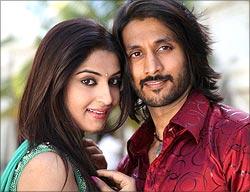Review: Dasamukha makes you think
April 13, 2012 11:10 IST
 Srikanth Srinivasa says Kannada film Dasamukha is an unusual film.
Srikanth Srinivasa says Kannada film Dasamukha is an unusual film.
The Hollywood film Twelve Angry Men made in the 1950s and Ek Ruka Hua Faisla made in Hindi in the early 1980s turned the spotlight on the jury system and how it helps the judiciary to discuss the issue of crime and the motive of its perpetrators. The premise of these films stands on one truth: that the accused must be given a fair trial.
Kannada film Dashamukha directed by Ravi Srivatsa is inspired by a Kannada play Aa Mukhagalu that was staged in the 1980s.
The film starts with the end of the murder trial of Agni (Chetan), with the judge unable to pronounce a verdict due to his confused state of mind. A jury comprising ten people is appointed to help the judge give a judgment. People from different walks of life come together to discuss the case threadbare and to ascertain if Agni is guilty of the crime.
Two cameras are placed inside the courtroom to record the proceedings. Right at the beginning, a vote is taken among the members to find out how the case stands and what the individual members think about the accused. Nine out of the ten members feel that Agni is guilty of committing the crime of killing his old paralytic father. A vote is taken every time there is a demand from a member when he or she thinks there is a change in the equation.
The lone opposition comes from Ravi (Ravichandran), who takes the side of the accused much to the surprise of his colleagues. As Ravi begins to clear things up, people come round and begin to think the same way he does. There's a verbal jugalbandi between Ravi and Venkatraman (Anant Nag) who becomes the lone member to believe that Agni is guilty.
Ravi narrates the story of Agni and his love for a polio-afflicted girl (Akanksha) and convinces the members to rally around him.
Anant Nag narrates his story and touches our hearts. The Mallya couple in the movie, Avinash and Malavika, oppose each other.
The film is heavily loaded with dialogue and one has to pay close attention or else one may miss the story and the context entirely.
Ravi Srivatsa has given us an experimental, offbeat film in a clear departure from his earlier outings like Deadly Soma, Rajeeva and Madhesha, Deadly II. He needs to be commended for making an effort to be different without bothering about the film's fate at the box-office. But the theme of the film is out of place in the Indian context and is not easy to relate to. The director could have tried to show more visuals outside the courtroom which could have made the film more appealing.
Once again it is a clear change of image for Ravichandran. There is no heroism and no romance for his fans in this movie.
Anant Nag is superb. Avinash has given an intense performance. Achyuta Rao is funny. Malavika, Devaraj and Duttatreya are adequate.
It has been more than two decades since Kannada cine-goers have seen Saritha, who has bloated beyond recognition. Once known for powerful performances, she comes a cropper in this film. Chetan has nothing much to do and neither has Akanksha.
Mathew Rajan's cinematography passes muster. Sadhu Kokila's background score is all right.
Watch Dashamukha for a different experience. It makes you think.
Rediff Rating: 

 Srikanth Srinivasa says Kannada film Dasamukha is an unusual film.
Srikanth Srinivasa says Kannada film Dasamukha is an unusual film.